新人教版八年级下册英语语法总结教学提纲
八年级下册英语知识点总结人教版
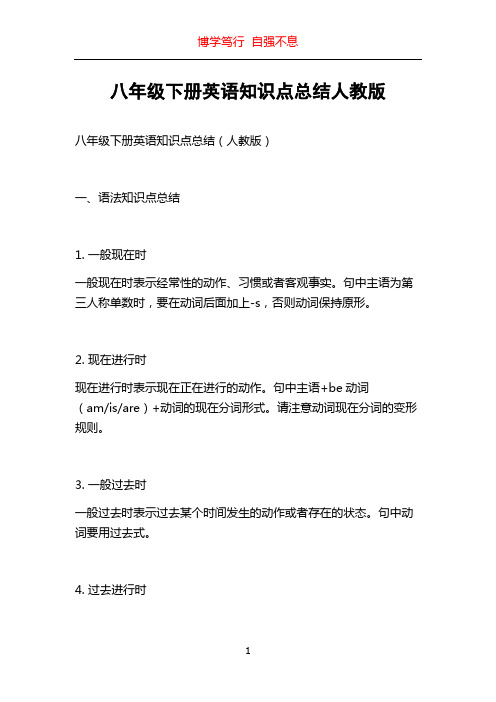
八年级下册英语知识点总结人教版八年级下册英语知识点总结(人教版)一、语法知识点总结1. 一般现在时一般现在时表示经常性的动作、习惯或者客观事实。
句中主语为第三人称单数时,要在动词后面加上-s,否则动词保持原形。
2. 现在进行时现在进行时表示现在正在进行的动作。
句中主语+be动词(am/is/are)+动词的现在分词形式。
请注意动词现在分词的变形规则。
3. 一般过去时一般过去时表示过去某个时间发生的动作或者存在的状态。
句中动词要用过去式。
4. 过去进行时过去进行时表示过去某个时间正在进行的动作。
句中主语+was/were+动词的现在分词形式。
5. 一般将来时一般将来时表示将来某个时间即将发生的动作或者存在的状态。
句中主语+will+动词原形。
否定形式为主语+will not(won't)+动词原形。
6. be going tobe going to表示打算或者计划进行某个动作。
句中主语+be动词(am/is/are)+going to+动词原形。
7. wish的用法wish可以表示希望或者后悔,后面接的从句用虚拟语气,即简单过去时。
例如:I wish I were taller.8. 一般条件句一般条件句表示条件与结果之间的关系,有真实条件和虚拟条件两种。
真实条件用一般现在时表示,虚拟条件用一般过去时表示。
9. 祈使句祈使句用来表示建议、命令、请求等,常以动词原形开头,否定形式前加don't。
10. 感叹句感叹句用来表达强烈的感觉或者惊讶的情绪,常常以How开头。
二、词汇知识点总结1. 动词的三种形式动词有原形、过去式和过去分词三种形式。
原形用于一般现在时,过去式用于一般过去时,过去分词用于完成时等。
2. 名词的复数形式名词复数形式的构成方法有规律可循:大部分名词在词尾加-s,以s、x、o、sh、ch结尾的名词在词尾加-es,以辅音字母+y结尾的名词把-y变为-i,再加-es。
3. 形容词的比较级和最高级形容词的比较级和最高级分别用于比较两个事物和三个或三个以上事物之间的程度差异。
人教版八年级下册英语复习提纲(通用3篇)

人教版八年级下册英语复习提纲(通用3篇)人教版八年级下册英语复习提纲篇1语法:直接引语间接引语(一)、概念:直接引语:说话人直接引用别人的原话,引用部分要加引号。
间接引语:说话人用自己的话把别人的意思转述出来,转述部分不用引号。
(二)、转换方法(两注意,一了解):两注意:先注意人称变化,再注意时态变化;一了解:指示代词、时间状语、地点状语的变化。
l人称变化:一随主(直接引语中的第一人称应随主句中的主语变为相应的人称,但注意只改人称不变词性)e.g. He said: “I am a good student.”→He said he was a good student. (主格)He said: “My parents are teachers.”→He said his parents were teachers. (形代)二随宾(直接引语中的第二人称应随主句中的宾语变为相应的人称,同样只改人称不变词性)e.g. He said (to me): “ You have to go there.” →He said I had to go there.(主格)He said (to me): “Your brother has to go there.”→He said my brother had to go there.(宾格)三不变(直接引语中的第三人称不需要改变)e.g. He said: “ He swims every day.”→He said he swam every day.l时态变化,按下表进行改变直接引语间接引语一般现在时一般过去时(客观真理除外,仍用现在时)现在进行时过去进行时现在完成时过去完成时一般过去时过去完成时过去完成时过去完时一般将来时过将来时一了解:指示代词、时间状语、地点状语可以不变,也可按以下规则进行变化:直接引语间接引语指示代词this这these这些that那those那些时间状语now现在then那时today今天that day那天tonight今晚that night那天晚上this week这星期that week那个星期yesterday昨天the day before前一天last week上星期the week before前一个星期ago以前before以前tomorrow明天the next/following day第二天next week下星期the next week第二个星期地点状语here这里there那里动词come来go去(三)、注意以下几种句型,它们在直接引语变间接引时,除了遵循以上人称和时态的变化外,还有一些特殊的要求:1.直接引语为陈述句,完全遵循以上方法;2.直接引语为一般疑问句、选择疑问句或反义疑问句时,先用“if”或“whether”来引出从句,再把从句写成一个陈述句。
人教版八年级英语下册知识点归纳教学提纲

人教版八年级英语下册知识点归纳PEP八年级英语下册知识点归纳Unit1What’s the matter?重点:1.情态动词should &shouldn’t的用法;2. have a+疾病;3.反身代词的用法。
难点:能询问并表述身体的种种不适以及对他人身体的种种不适给予适当的建议。
知识点:What’s the matter?怎么了?What’s the matter with you? =What’s the trouble with you? =What’s wrong with you?你怎么了?have a cold=catch a cold感冒have a stomachache胃痛have a sore+部位……痛(have a sore back背疼)lie down躺下have a fever发烧take breaks休息away from远离shout for help大声呼救take one’s temperature量体温have a cough咳嗽get an X-ray拍X光片on the side of the road在马路边get off下车to one’s surprise出乎某人意料in time及时(on time准时)thanks to多亏;由于right away马上,立即get into陷入have a toothache牙痛have a nosebleed流鼻血get into trouble陷入困境put one’s head down低头put a bandage on sth.用绷带包扎get hit on the head 砸到头(注意v.+on the+身体部位的表达方达)be interested in对……感兴趣There were many times when…(when引导的定语从句)be used to doing sth.习惯做某事take risks=take a risks冒险because of因为run out用光in…situation处于……境地get out of逃离of importance =important(of+n.=adj.)be in control of管理give up放弃make a decision做决定never give up绝不放弃Unit2I’l help to clean up the city parks.重点&难点:1.不定式作宾语、状语和宾补的用法;2.could表建议时的用法;3.掌握短语:run out of,take after,fix up, give away等;4.学会用will和would like表达意愿。
人教版八年级下册各单元英语语法解析知识重点总结
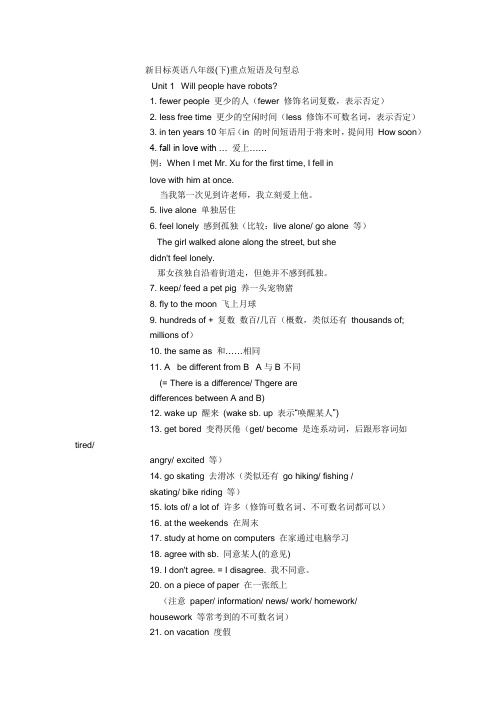
新目标英语八年级(下)重点短语及句型总Unit 1 Will people have robots?1. fewer people 更少的人(fewer 修饰名词复数,表示否定)2. less free time 更少的空闲时间(less 修饰不可数名词,表示否定)3. in ten years 10年后(in 的时间短语用于将来时,提问用How soon)4. fall in love with … 爱上……例:When I met Mr. Xu for the first time, I fell inlove with him at once.当我第一次见到许老师,我立刻爱上他。
5. live alone 单独居住6. feel lonely 感到孤独(比较:live alone/ go alone 等)The girl walked alone along the street, but shedidn't feel lonely.那女孩独自沿着街道走,但她并不感到孤独。
7. keep/ feed a pet pig 养一头宠物猪8. fly to the moon 飞上月球9. hundreds of + 复数数百/几百(概数,类似还有thousands of;millions of)10. the same as 和……相同11. A be different from B A与B不同(= There is a difference/ Thgere aredifferences between A and B)12. wake up 醒来(wake sb. up 表示“唤醒某人”)13. get bored 变得厌倦(get/ become 是连系动词,后跟形容词如tired/angry/ excited 等)14. go skating 去滑冰(类似还有go hiking/ fishing /skating/ bike riding 等)15. lots of/ a lot of 许多(修饰可数名词、不可数名词都可以)16. at the weekends 在周末17. study at home on computers 在家通过电脑学习18. agree with sb. 同意某人(的意见)19. I don't agree. = I disagree. 我不同意。
新人教版|八年级下册英语所有语法全汇总
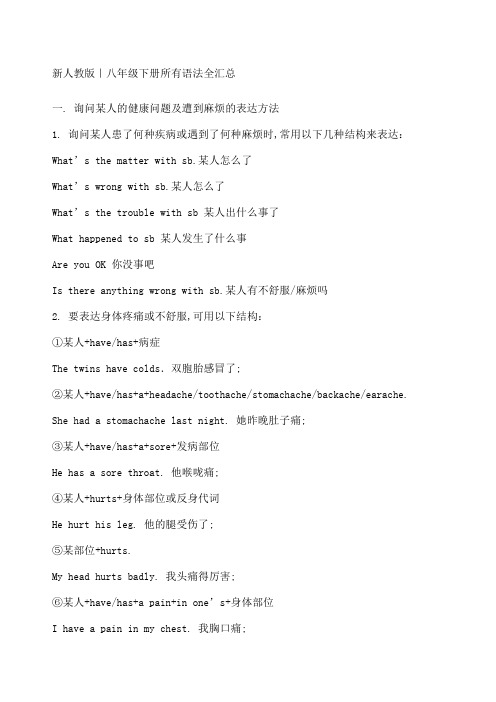
新人教版|八年级下册所有语法全汇总一. 询问某人的健康问题及遭到麻烦的表达方法1. 询问某人患了何种疾病或遇到了何种麻烦时,常用以下几种结构来表达:What’s the matter with sb.某人怎么了What’s wrong with sb.某人怎么了What’s the trouble with sb 某人出什么事了What happened to sb 某人发生了什么事Are you OK 你没事吧Is there anything wrong with sb.某人有不舒服/麻烦吗2. 要表达身体疼痛或不舒服,可用以下结构:①某人+have/has+病症The twins have colds.双胞胎感冒了;②某人+have/has+a+headache/toothache/stomachache/backache/earache. She had a stomachache last night. 她昨晚肚子痛;③某人+have/has+a+sore+发病部位He has a sore throat. 他喉咙痛;④某人+hurts+身体部位或反身代词He hurt his leg. 他的腿受伤了;⑤某部位+hurts.My head hurts badly. 我头痛得厉害;⑥某人+have/has+a pain+in one’s+身体部位I have a pain in my chest. 我胸口痛;⑦There is something wrong with one’s+身体部位There is something wrong with my right eye. 我的右眼有毛病;⑧其他表达方式She has a heart trouble. 她有心脏病;He got hit on the head. 他头部受到了撞击;She cut her finger. 她割破手指了;二. 情态动词should的用法1. should为情态动词,意为“应该;应当”,否定式为shouldn’t,其后接动词原形,无人称和数的变化;常用来表示征询意见、建议、劝告、要求或义务等;You should drink more water. 你应该多喝水;He should put his head back. 他应该把头后仰;We should try our best to help him. 我们应当尽力去帮助他; You shouldn‘t watch TV. 你不应该看电视;2. should用于主语为第一人称的疑问句,表示征询意见;Should I put some medicine on it 我应当给它敷上药吗Should we tell her about it 我们应该告诉她这件事吗3. 在英语中,表示建议的说法有很多,而且都是中考考查的重点;主要结构有:①Would you like to do sth你想要/愿意做某事吗Would you like to play basketball with me 你想要和我一起打篮球吗②Shall I/we do sth 我/我们做某事好吗Shall we go to the zoo tomorrow 明天我们去动物园,好吗③Why not do sth 为什么不......呢Why not join us为什么不加入到我们当中来呢④How/What about doing sth 做某事怎么样How about going swimming 去游泳怎么样⑤Let’s do sth. 让我们做......吧;Let’s go home. 咱们回家吧;⑥You’d better not do sth 你最好不要做某事;You’d better not go there alone. 你最好不要一个人去那儿;三. 反身代词英语中共有八个反身代词,在使用时应注意和它所指的相应的对象在人称、性别和数上保持一致;第一人称第二人称第三人称单数 myself yourself himself/herself/itself复数 ourselves yourselves themselves反身代词的用法1. 可用作宾语,指的是宾语和主语表示同一个或同一些人或事物;如:Maria bought herself a scarf.We must look after ourselves very well.2. 可用作表语,指的是表语和主语表示同一个或同一些人或事物;如: She isn’t quite herself today.3. 可用作主语或宾语的同位语,常用来加强语气;如:She herself will fly to London tomorrow.I met the writer himself last week.4. 用在某些固定短语当中;如:look after oneself / take care of oneself 照顾自己teach oneself sth./learn sth. by oneself 自学enjoy oneself 玩得高兴,过得愉快help oneself to sth 请自用……随便吃/喝些……hurt oneself 弄伤自己say to oneself 自言自语leave sb. by oneself 把某人单独留下注意反身代词不能单独做主语,但可以做主语的同位语,起强调作用;如:我自己能完成作业;误Myself can finish my homework.正I myself can finish my homework. / I can finish my homework myself.四. 一般将来时一般将来时表示将来某个时间要发生的动作或状态,或将来经常发生的动作或状态;一般将来时的基本结构1. will+动词原形否定式:will not=won't一般疑问式:will/shall+主语+动词原形+其他特殊疑问式:特殊疑问词+一般疑问式—Will he help you with your English tonight今天晚上他会帮助你学习英语吗—Yes, he will./No, he won't.是的,他会;/不,他不会;—When will you arrive for America你什么时候去美国—Tomorrow.明天;2. am/is/are going to +动词原形否定式:am/is/are not going to +动词原形一般疑问式:am/is/are +主语+ going to + 动词原形+其他特殊疑问式:特殊疑问词+一般疑问式Look at the dark clouds. There is going to be a storm.看那乌云,快要下雨了;Is he going to collect any data for us他会帮我们收集数据吗What are you going to do tomorrow明天你打算作什么3. will+动词原形与am/is/are going to +动词原形的用法区别will+动词原形与am/is/are going to +动词原形的用法虽然都表示将来发生动作或情况,一般情况下能互换;但它们的用法是有区别的;will主要用于在以下三个方面:1表示主观意愿的将来;They will go to visit the factory tomorrow.明天他们将去厂参观工厂;2表示不以人的意志为转移的客观的将来;He will be thirty years old this time next year.明年这个时候他就将三十岁;3表示临时决定,通常用于对话中;—Mary has been ill for a week.玛丽病了一周了;—Oh, I didn't know. I will go and see her.噢,我不知道;我去看看她;be going to主要用于以下两个方面:1表示事先经过考虑、安排好打算、计划要做某事;Dad and I are going to watch an opera this afternoon.今天下午我和爸爸打算去看歌剧;2表示根据目前某种迹象判断,某事非常有可能发生,表示推测;Look There come the dark clouds. It is going to rain.瞧乌云密集;天要下雨了;五. 动词不定式to do的用法1. 作主语为避免句子的头重脚轻,常用it作为形式主语,而真正的主语动词不定式后置; 常用句型:It +be+adj./n.+for/of sb. to do sth./It takes sb. some time to do sth.2. 作宾语动词want, decide, hope, ask, agree, choose, learn, plan, need, teach, prepare常接动词不定式作宾语;3. 作后置定语常用于“have/has+sth.+to do”或“Its time to do sth.”等结构中;4. 作宾语补足语tell, ask, want, invite, teach, like, call等可接带to的动词不定式作宾语补足语,构成tell/ask/want /call/invite sb. to do sth.结构;注意动词不定式作使役动词和感官动词的宾语补足语时应省去to:“一感feel,二听listen to, hear,三让let, make, have,四看look at, see, watch, notice,半帮助help”;5. 动词不定式作状语主要用来修饰动词,表示目的,结果或原因;为了强调目的,有时可以把动词不定式放在句首,或在不定式前加in order to 或so as to “为了,目的是”;六. Could you please...句型1. 请求别人时通常用此句型,也可以说Can you...please情态动词could或can 在这里均表示请求,在意思上无区别,但是用could在于其显得更委婉、客气、诚恳;在日常生活中常使用could you/I...若在句末加上please,则显得更礼貌; Could you help me find my book, please你能帮我找到我的书吗2. 对could you/I...的问句作出肯定回答,常用“sure/certainly/of course”等;如果作否定回答,常用“sorry或oh, please don’t”; 一般不用no开头,用no显得语气生硬、不礼貌;3. 表示请求的其他句式Would you like to do...Would you mind doing...Let’s do....Please do...祈使句前加please七. 过去进行时1. 基本概念:过去进行时表示在过去某一时刻或一段时间内正在进行的动作;这一特定的过去时间除有上下文暗示以外, 一般用时间状语来表示;常用的时间状语this morning, the whole morning, all day yesterday, from nine to ten last evening, when, while等;We were watching TV from seven to nine last night.昨天晚上七点到九点的时候我们在看电视;It was raining when they left the station.他们离开车站的时候天正在下雨;2. 基本结构 was / were not + 动词-ing3. 一般过去时与过去进行时用法的比较一般过去时表示在过去某个时间发生过的动作或存在的状态, 而过去进行时则表示在过去某一时刻或某一段时间正在进行的动作;David wrote a letter to his friend last night. 大卫昨晚给他的朋友写了封信;信写完了;David was writing a letter to his friend last night. 大卫昨晚一直在给他的朋友写信;信不一定写完;八. 状语从句1. unless引导条件状语从句unless = if...not... 除非,若不They will go tomorrow unless it rains.= They will go tomorrow if it doesn’t rains.2. as soon as引导时间状语从句,意为“一...就...”;He will come and see you as soon as he can.3. so...that...引导结果状语从句句型1:主语+谓语+so+形容词/副词+that从句The wind was so strong that we could hardly move forward. 句型2: so +形容词 + a/an + 单数名词 + that从句It was so hot a day that they all went swimming.句型3. so + many/ few + 复数名词 + that从句He has so few friends that he often feels lonely.句型4: so +much/ little + 不可数名词 + that 从句I had so little money that I couldn’t buy a pen.九. 形容词/副词的比较等级形容词和副词有三个比较等级,即原级也就是原形、比较级表示“较……”或“更……”的意思,用于两者之间比较和最高级表示“最……”的意思,用于三者或三者以上的比较;1. 形容词/副词的比较级和最高级的规则变化1单音节词和少数以-er,-ow结尾的双音节单词,比较级在后面加-er,最高级在后面加-est;①单音节单词small→smaller→smallestshort→shorter→shortesttall→taller→tallestgreat→greater→greatest②少数以-er,-ow结尾的双音节单词clever→cleverer→cleverestnarrow→narrower→narrowest2以不发音e结尾的单音节单词,比较级在原形后加-r,最高级在原级后加-st; large→larger→largestnice→nicer→nicestable→abler→ablest3以一个辅音字母结尾的闭音节即:辅音+元音+辅音单词中,先双写末尾的辅音字母,比较级加-er,最高级加-est;big→bigger→biggesthot→hotter→hottestfat→fatter→fattest4以“辅音字母+y”结尾的双音节词, 把y改为i,比较级加-er,最高级加-est; easy→easier→easiestheavy→heavier→heaviestbusy→busier→busiesthappy→happier→happiest5其他双音节词和多音节词,比较级在前面加more,最高级在前面加most; beautiful→more beautiful→most beautifuldifferent→more different→most differenteasily→more easily→most easily2. 形容词/副词的比较级和最高级的不规则变化good→better→bestwell→better→bestbad→worse→worstill→worse→worstold→older/elder→oldest/eldestmany/much→more→mostlittle→less→leastfar →further/farther→ furthest/farthest3. 原级常用句型1A is as+原级+ as+ B 表示A与B一样...eg. He is as tall as me.2A is not as/so +原级+ as B 表示A不如B...eg. He is not as tall as me.3只能修饰原级的词,very,quite,so,too,so,enough,pretty等 ; eg. He is too tired to walk on.他太累了以至于不能再继续走了;4. 比较级常用句型1当句中有than时则用比较级;eg. He is fatter than me.2“特殊疑问词+be+形容词比较级,A or B ”eg. Which is bigger,the earth or the moon哪一个更大,地球还是月球3“比较级+and+比较级”表示“越来越...”;eg. The flowers are more and more beautiful.花儿越来越漂亮;English is more and more important. 英语越来越重要了;4“the+比较级,the+比较级”表示“越...,越...”;eg. The more careful you are,the fewer mistakes you’ll make.5可以修饰比较级的词:much,a lot,far,a little,a bit,even,still等;eg. Lesson One is much easier than Lesson Two. 第一课比第二课容易得多;5. 最高级常用句型1.“主语+be+the+形容词最高级+单数名词+in/of...”表示“……是……中最……的”;Tom is the tallest in his class/of all the students.汤姆是他们班上/所有学生当中最高的;2.“主语+实意动词+the+副词最高级+in/of...”表示“……是……中最……的”;I jump the farthest in my class.我是我们班跳得最远的;3.“主语+be+one of the+形容词最高级+复数名词+in/of...”表示“……是……中最……之一”;Beijing is one of the largest cities in China.北京是中国最大城市之一;4.“特殊疑问词+be+the+最高级,甲,乙,or丙”用于三者或三者以上的比较; Which country is the largest,China,Brazil or Canada哪个国家最大,中国,巴西还是加拿大5.“特殊疑问词+助动词+主语+the+副词最高级+甲,乙,or丙”用于三者或三者以上的比较;Which season do you like the best,spring,summer or autumn你最喜欢哪一个季节,春天,夏天还是秋天注意:副词最高级用在句中时,其前可以加the,也可以不加;但形容词最高级用在句中时,其前一般都要加the;十. 现在完成时一. 现在完成时基本结构①肯定句:主语+have/has+动词的过去分词②否定句:主语+have/has+not+动词的过去分词③一般疑问句:Have/Has+主语+动词的过去分词④特殊疑问句:特殊疑问词+一般疑问句have/has+主语+过去分词二. 现在完成时用法1. 现在完成时用来表示过去已经完成的动作对现在造成影响或后果;也就是说,动作或状态发生在过去但它的影响现在还存在,强调的是现在;I have already posted the photo.我已经邮寄出了照片;与此种用法连用的时间状语时一些模糊的过去时间状语,如already肯定句, yet 否定句/疑问句, just, before, recently,still, lately,never等;2. 现在完成时也可用来表示动作或状态发生在过去某一时刻,持续到现在并且有可能会继续持续下去;He has lived here since 1978.自从1978年以来,他一直住在这儿;动作起始于1978年,一直住到现在,可能还要继续住下去;此种用法常与for+时间段,since+时间点或过去时的句子连用;谓语动词必须是延续性动词;有些瞬间动词可变为延续动词:go out----be outfinish----be overopen----be opendie----be deadbuy---havefall ill---be illcome back----be backcatch a cold----have a cold。
(完整版)最新人教版八年级英语下册各单元语法点汇总
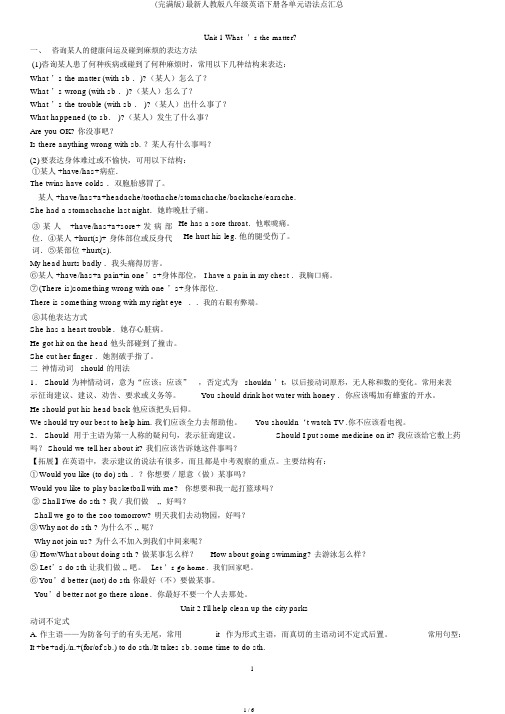
Unit 1 What ’s the matter?一、咨询某人的健康问运及碰到麻烦的表达方法(1)咨询某人患了何种疾病或碰到了何种麻烦时,常用以下几种结构来表达:What ’s the matter (with sb .)?(某人)怎么了?What ’s wrong (with sb .)?(某人)怎么了?What ’s the trouble (with sb . )?(某人)出什么事了?What happened (to sb. )?(某人)发生了什么事?Are you OK? 你没事吧?Is there anything wrong with sb. ?某人有什么事吗?(2)要表达身体难过或不愉快,可用以下结构:①某人 +have/has+病症.The twins have colds .双胞胎感冒了。
某人 +have/has+a+headache/toothache/stomachache/backache/earache. She had a stomachache last night.她昨晚肚子痛。
③某人+have/has+a+sore+发病部位.④某人 +hurt(s)+ 身体部位或反身代词.⑤某部位 +hurt(s).He has a sore throat.他喉咙痛。
He hurt his leg. 他的腿受伤了。
My head hurts badly .我头痛得厉害。
⑥某人 +have/has+a pain+in one’s+身体部位,I have a pain in my chest .我胸口痛。
⑦(There is)something wrong with one ’s+身体部位.There is something wrong with my right eye..我的右眼有弊端。
⑧其他表达方式She has a heart trouble.她存心脏病。
He got hit on the head 他头部碰到了撞击。
人教版八年级英语下册单元知识点总结及语法汇总
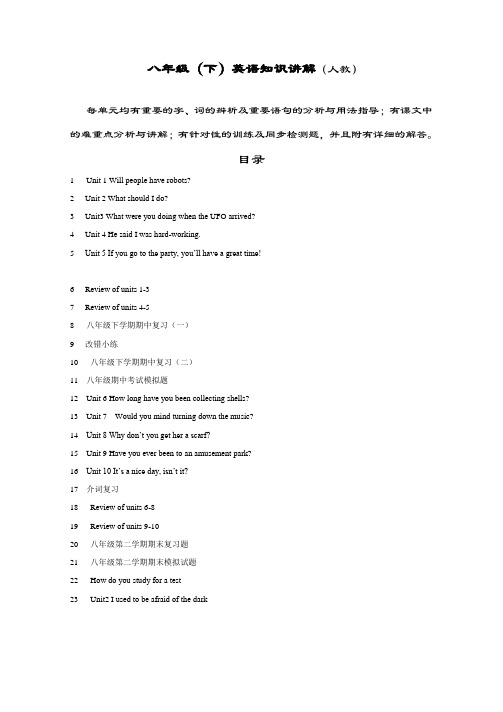
八年级(下)英语知识讲解(人教)每单元均有重要的字、词的辨析及重要语句的分析与用法指导;有课文中的难重点分析与讲解;有针对性的训练及同步检测题,并且附有详细的解答。
目录1 Unit 1 Will people have robots?2 Unit 2 What should I do?3 Unit3 What were you doing when the UFO arrived?4 Unit 4 He said I was hard-working.5 Unit 5 If you go to the party, you’ll have a great time!6 Review of units 1-37 Review of units 4-58 八年级下学期期中复习(一)9 改错小练10 八年级下学期期中复习(二)11 八年级期中考试模拟题12 Unit 6 How long have you been collecting shells?13 Unit 7Would you mind turning down the music?14 Unit 8 Why don’t you get her a scarf?15 Unit 9 Have you ever been to an amusement park?16 Unit 10 It’s a nice day, isn’t it?17 介词复习18 Review of units 6-819 Review of units 9-1020 八年级第二学期期末复习题21 八年级第二学期期末模拟试题22 How do you study for a test23 Unit2 I used to be afraid of the darkUnit 1Will people have robots?II. Grammar:·一般将来时·there will be ·few,a few,little,a little,much,many语法小结:一、一般将来时1.用be doing表示将来:主要意义是表示按计划、安排即将发生的动作,常用于位置转移的动词。
人教版八年级下册英语Unit1知识点语法归纳总结

⼈教版⼋年级下册英语Unit1知识点语法归纳总结Unit 1 What’s the matter?1.短语归纳2.典句必背3.⽤法集萃(1)当别⼈⼼情不好,⾝体不适或遇到⿇烦时,我们可以⽤如下表达表⽰关⼼:?What’s the matter? What’s the matter with youWhat’s wrong with …What’s the trouble\problem with …(2)英语中常⽤have描述⾝体的不适,此时have意为“患有”,常⽤结构:①have a + 疾病例:have a cold 感冒;have a fever 发烧;have a cough 咳嗽②have a + ⾝体部位-ache例:have a headache 头痛;have a toothache ⽛痛③have a sore + ⾝体部位例:have a sore throat 咽喉痛;have a sore back 背痛(3)lie down躺下;tell lies/a lie 说谎(4)maybe & may be①maybe,“或许”,常⽤于句⾸,表⽰可能性,后加句⼦。
例:Maybe you are right.②may be,是情态动词+be的结构,意为“可能,也许”,后加名词、代词或形容词。
例:He may be angry.(5)sound like & sound①sound like+名词/代词/从句例:It sounds like you don’t know the truth. It sounds like a good idea.②sound+形容词,“听起来,好像”,例:The music sounds nice.(6)…when the driver saw an old man lying on the side of the road. ……这时司机看到意为⽼⼈躺在路边。
人教版八年级下册英语 Unit 9 语法知识点复习提纲(全面!)

人教版八年级下册英语Unit 9 语法知识点复习提纲Unit 9 Have you ever been been to a museum?第一课时Section A(1a-2d)重点单词amusement n. 娱乐;游戏somewhere adv.在某处;到某处camera n. 照相机;摄影机;摄像机invention n. 发明;发明物重点短语have been to...去过……(已回来)amusement park游乐场go skating去溜冰learn about了解lead to导致;(道路)通往put up搭建重点句子1.Have you ever been to a museum?你曾经去过博物馆吗?2.Me neither.我也没(去过)。
3.Let’s go somewhere different today.我们今天去个不一样的地方吧。
4.It’s really interesting,isn’t it?那真的很有趣,不是吗?自主学习根据句意及音标提示写出单词及其汉语意思。
1.There is an amusement /ə’mjuːzmənt/ park in the center of the city.娱乐;游戏2.Let’s go to the history museum /mju’ziːəm/ this weekend.博物馆3.Why notI start with the most interesting/’IntrəstIŋ/one? 有趣的4.My brother doesn’t like playing chess.Neither /’naIðə(r)/ do I.也不5.What happens when we go to space /speIs/?太空;空间要点点拨Me neither.Me neither.意为“我也不”,表示前面提到的否定情况也适用于后者,相当于“Neither+be动词/情态动词/助动词+I”。
人教版八年级下册英语第3单元Unit 3 语法知识点提纲

人教版八年级下册英语第3单元Unit 3 语法知识点提纲Unit 3 Could you please clean your room?一.重点词汇1.Rubbish n. 垃圾;废弃物该词为不可数名词。
同义词有:waste, trash, garbage,litter 2.Take ou the rubbishTake out v. 带出去,取出;除掉,拔出该词组的宾语如果是代词(it/them)时,代词要放在take和out 之间。
3.Fold v. 折叠;对折unfold v. 展开;呈现4.Mess n. 杂乱;不整洁[常见搭配] be in a mess 乱七八糟,处境困难;凌乱Messy adj. 凌乱的;使不整洁的5.Throw v. 扔;掷threw (过去式)[常见搭配] throw away 扔掉,丢弃throw out 扔掉;伸出;说出throw into 扔进;使...(突然)陷入6.Neither adv. 也不;pron. 两者都不[用法](1)”neither/nor + 情态动词/助动词/be动词+ 主语”是一个倒装结构,表示前句的否定情况也适应于后面的人或物。
该结构中的助动词,情态动词,be动词形式必须与前面句子的谓语动词时态,以及后面句子的主语的人称和数保持一致。
例如:Mary can’t play the guitar, neither can her sister.I don’t like this book, neither does Tom.(2)Neither (of) + n. 作主语时,谓语动词用单数。
例如:Neither of the two boys likes playing football.Neither answer is right.(3)Neither...nor... 既不...也不...当链接两个并列主语时,谓语动词通常要与nor后面的名词或代词在人称和数上保持一致,即该结构要用就近原则。
人教版初中英语八年级下册全册各单元知识点、语法归纳整理
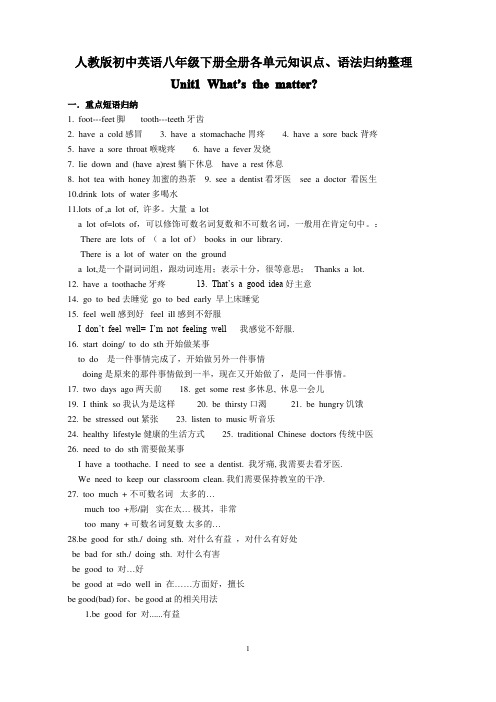
人教版初中英语八年级下册全册各单元知识点、语法归纳整理Unit1W hat’s the matter?一.重点短语归纳1.foot---feet脚tooth---teeth牙齿2.have a cold感冒3.have a stomachache胃疼4.have a sore back背疼5.have a sore throat喉咙疼6.have a fever发烧7.lie down and(have a)rest躺下休息have a rest休息8.hot tea with honey加蜜的热茶9.see a dentist看牙医see a doctor看医生10.drink lots of water多喝水11.lots of ,a lot of,许多。
大量a lota lot of=lots of,可以修饰可数名词复数和不可数名词,一般用在肯定句中。
:There are lots of(a lot of)books in our library.There is a lot of water on the grounda lot,是一个副词词组,跟动词连用;表示十分,很等意思;Thanks a lot.12.have a toothache牙疼13.That’s a good idea好主意14.go to bed去睡觉go to bed early早上床睡觉15.feel well感到好 feel ill感到不舒服I don’t feel well=I’m not feeling well我感觉不舒服.16.start doing/to do sth开始做某事to do是一件事情完成了,开始做另外一件事情doing是原来的那件事情做到一半,现在又开始做了,是同一件事情。
17.two days ago两天前18.get some rest多休息,休息一会儿19.I think so我认为是这样20.be thirsty口渴21.be hungry饥饿22.be stressed out紧张23.listen to music听音乐24.healthy lifestyle健康的生活方式25.traditional Chinese doctors传统中医26.need to do sth需要做某事I have a toothache.I need to see a dentist.我牙痛,我需要去看牙医.We need to keep our classroom clean.我们需要保持教室的干净.27.too much+不可数名词太多的…much too+形/副实在太…极其,非常too many+可数名词复数太多的…28.be good for sth./doing sth.对什么有益,对什么有好处be bad for sth./doing sth.对什么有害be good to对…好be good at=do well in在……方面好,擅长be good(bad) for、be good at的相关用法1.be good for对......有益Doing morning exercises is good for your health.做早操对你们的建康有益。
八年级下册英语复习提纲人教版
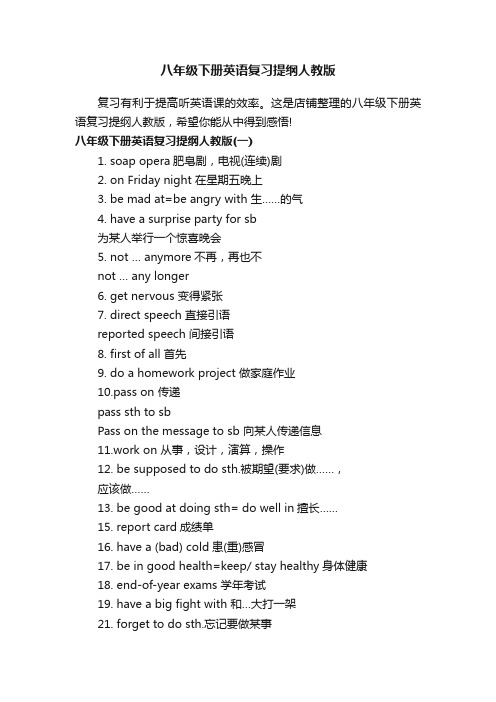
八年级下册英语复习提纲人教版复习有利于提高听英语课的效率。
这是店铺整理的八年级下册英语复习提纲人教版,希望你能从中得到感悟!八年级下册英语复习提纲人教版(一)1. soap opera肥皂剧,电视(连续)剧2. on Friday night 在星期五晚上3. be mad at=be angry with 生……的气4. have a surprise party for sb为某人举行一个惊喜晚会5. not … anymore不再,再也不not … any longer6. get nervous 变得紧张7. direct speech 直接引语reported speech 间接引语8. first of all 首先9. do a homework project 做家庭作业10.pass on 传递pass sth to sbPass on the message to sb 向某人传递信息11.work on 从事,设计,演算,操作12. be supposed to do sth.被期望(要求)做……,应该做……13. be good at doing sth= do well in擅长……15. report card成绩单16. have a (bad) cold患(重)感冒17. be in good health=keep/ stay healthy身体健康18. end-of-year exams 学年考试19. have a big fight with 和…大打一架21. forget to do sth.忘记要做某事forget doing sth.忘记做了某事22. get over克服,恢复,原谅23. a poor mountain village一个贫穷的山村24. sound like +n听起来像25. Graduate from 从……毕业26. In the mail 在邮箱里27. It's a good idea for sb to do sth某人去做某事是一个好主意28. China’s rural areas中国的偏远地区29. sea level海平面above sea level海拔30. the thin air稀薄的空气31. agree with sb./sth.同意, 与……相符(一致)32. both … and …两者都33.finish doing sth 完成做某事34. open up打开,展开,开发,揭露open up one's eyes to 开拓某人的视野到......35. a good start一个良好的开端36. care for=look after=take care of照料,照顾,计较,关心37. in danger处于危险之中38.start a bad habbit养成一个坏习惯39.copy one’s homework抄袭某人的做业40.send one’s love 问好41.find science really difficult发现科学真的很难42.make a decision to do sth=decide to do sth 决定做某事43.decide to do sth决定做某事44.there is no difference between ...and...在...和...之间没有区别45.it's just that...只不过,只是46.be over结束,完成47.in the city of......市48.a one-year program一个一年期的项目49.people who need help需要帮助的人50.something we can do for them我们能为他们做的事八年级下册英语复习提纲人教版(二)转述他人话语:What did sb. say? He said I …She said she…They said…1. 许老师告诉我徐梦蝶会说二种语言。
人教版英语八年级全年(上+下册)语法提纲+语言要求

人教版英语八年级全年(上+下册)语法提纲+语言要求八年级英语上册语法要求:1 一般过去式的复习(用法、结构、时间状语、动词构成规则)及不定代词2 频度副词3 形容词、副词的比较级最高级构成规则4 形容词、副词的比较级最高级的“三级用法”5 句子成分构成及动词不定式初级学习6 一般将来时结构1:be going to(用法、结构、时间状语)7 一般将来时结构2:will + be(用法、结构、时间状语)8 名词的高级用法、定冠词的九种用法9 情态动词10 状语从句----条件状语从句11 熟悉五种基本句型和三种基本的句子结构12 连词的学习13 动词的种类八年级英语上册语言要求1 能熟练使用一般过去式描述过去发生的事情,谈论假期生活2 能熟练使用频度副词来回答由how often引导的对频率(单位时间内一个动作发生的次数)的提问3 能掌握形容词、副词的“原比最三级构成”规则4 能掌握形容词、副词的“原比最三级应用”,描述生活中可以用来对比的事物5 能使用动词不定式结构来描述自己的打算、计划等日常安排6 能使用一般将来时be going to 结构谈论将来的具体活动、安排、计划、打算等7 能使用一般将来时will + be 结构谈论一般性的未来将会发生的事情、打算等8 能使用表示顺序的副词来描述做一项事务的活动顺序9 能使用情态动词can来做日常邀请10 能使用状语从句用来假定一个条件后,会发生的事情需要拥有800—1200个词汇量,能书写60—80字的一般性的英语文章八年级英语下册语法要求:1 情态动词should提建议、反身代词2 动词不定式的高级用法及短语动词的归纳学习3 情态动词could表示能力、可能性4 提建议的八种基本句型、状语从句(时间/目的/让步状语从句)5 过去进行时6 状语从句(条件/时间/结果状语从句)7 形容词、副词三级的构成及高级用法8 现在完成时9 现在完成时的高级用法及与一般过去时的区别10 现在完成时和较特殊的连词搭配时的应用11 状语从句综合学习12 动词不定式高级用法13 情态动词的综合学习14 宾语从句简单学习(初三单元2重点学习)八年级英语下册语言要求:1谈论日常健康问题并提出相应建议及简单的急救常识2 能使用动词不定式的结构来提供简单的帮助3 做礼貌的请求及询问许可4 谈论问题并给出建议5 能使用过去进行时来谈论过去的某一时刻,人们正在做的事情6 能综合学过的时态和状语从句来讲述发生过的故事。
人教版八年级下册英语期中复习重点语法知识点提纲(实用!)

人教版八年级下册英语期中复习重点语法知识点提纲Unit 1 What’s the matter?1.It doesn’t matter. 没关系2. ①What’s the matter (with sb./sth.)?②What’s the trouble (with sb./sth.)?③What’s wrong (with sb./sth.)?④What happened (to sb.)?3. have a headache / toothache/ stomachache/ backache 头痛/牙痛/胃痛/背痛have a sore throat 喉咙痛4. have a pain in the arm./ on my head. 胳膊痛/头痛5. have a (bad) cold 得(重)感冒have a fever / temperature 发烧have a cough 咳嗽have the flu 得流感6. lie down and rest 躺下休息(过去式:lay)tell a lie / tell lies 说谎8. take / have a (good) rest (好好)休息9. get an X-ray 拍个X光片10. take breaks/take a break 休息break into破门而入break down 坏了break out 爆发break rules 打破规则break one’s leg 摔断了腿11. get off /on上/下车+ a bus / train / planeget into 进入;上车+ a car / taxiget out of 从…出来;下车+ a car / taxi12. to one’s surprise 令某人惊讶的是to one’s joy 令某人高兴的是in surprise 惊讶地surprise sb.使某人惊讶be surprised at…对…惊讶13. be in trouble 处于麻烦中get into trouble 陷入困境have trouble/problems/difficulty (in) doing sth. 做某事有麻烦14. hit sb. on the + 硬部位(head、back等)hit sb. in the + 软部位(mouth、face等)get hit in / on + 部位…部位受到撞击15. right away 立即;马上(用于将来时)= at once / in a minute / right now16. be sick = be ill fall ill 生病a sick man 一个生病的人17. be / get used to doing sth. 习惯于做某事used to do sth. 过去常常做某事18. take a risk / take risks 冒险19. an accident 一场事故20.in a dangerous/safe situation处境危险/安全21. run out of +宾语run out(放在句末)22. cut off 切除;切断cut down 砍倒(cut them down)cut up 切碎(cut them up)cut…into…把…切成…23. mean doing sth. 意味着做某事mean to do sth. 打算做某事24. the importance of ... …的重要性25. make decisions / make a decision 做决定decide to do sth. 决定做某事26. be in control of 掌管;管理27. death n.死亡die v.死亡dead adj.死的dying adj.垂死的28. give up doing sth. 放弃give it upgive away 捐赠give out 分发;散发Unit 2 I’ll help to clean up the city parks.1.clean it up 打扫干净have a big clean-up 大扫除2. cheer sb. up 使某人振奋起来3.volunteer in / for…volunteer to do sth. 志愿做某事4. come up with 想出;提出catch up with 追上;赶上come out 出来;开花;出版come true 实现come up走近;走上前来come over 过来5. put off sth. / doing sth. 推迟put on 穿上;上演put up 支起;张贴put out伸出;熄灭put away把…收拾起来put down 放下6.see/hear/watch /find / notice sb. doing sth. see / hear / watch / find / notice sb. do sth.7.hand out 分发hand in 上交8.call up 打电话给(某人);征召9.feel lonel感觉孤独live alone独自生活10.care for=look after=take care of 照顾;照料11.be strong in=be good at/do well in 擅长…a strong feeling of satisfaction 极强的满足感12.to one’s satisfaction 令某人满意的是be satisfied / pleased with 对…满意13.the owner of …的主人on one’s own = by oneself = alone 独自地14.try out (for) 参加…选拔;试用15.go on a journey 去旅行16.raise money for 为…筹钱raise one’s hand / head 举手/ 抬头17.fix up 修理;装饰18.take after(外貌或行为)像=be similar to19.set up 建起;设立20.the disabled 残疾人(复数)21.make a difference to doing sth.对…产生影响22.the blind 盲人(复数)the deaf 耳朵失聪的人(复数)23.imagine doing sth. 想象做某事24.train sb. to do sth. 训练某人做某事25.be excited about…对…感到兴奋an exciting movie26.change one’s life 改变某人的生活27.take / have / show an interest in= be interested in 对…感兴趣28.make it possible to do sth.29.make sb. do sth.30.do what we can to help others31.so much homework / so interesting / such good adviceUnit 3 Could you please clean your room? take out the rubbish 倒垃圾throw the rubbish about 乱扔垃圾take out 拿出;取出take off 脱下;起飞take away 带走take up 开始做;占据fold one’s clothes 叠衣服sweep the floor 扫地make a mess 弄得一团糟be in a mess 乱七八糟throw down 扔下;随手丢下throw away 扔掉throw around / about 乱扔throw to…扔给…(无恶意)throw at 向…扔去(带攻击性)all the time 一直;总是,多用于句末neither+be/助动词/情态动词+主语“…也不”as soon as 一…就…(主将从现)pass sb. sth. = pass sth. to sb. 递给某人某物pass the exam 通过考试;考试及格borrow sth. from sb.向某人借来某物lend sb. sth. = lend sth. to sb. 借给某人某物要与一段时间连用时,只能用keep(保存;借了某物多长时间)hate doing / to do sth. 讨厌做某事do chores 做家务think for a while 想了一会儿without stress 没有压力under stress 在压力下a waste of time 一种时间的浪费waste time / money on sb. / sth. 在某人/某物上浪费时间/金钱waste time / money doing sth. 浪费时间/金钱做某事in order to do sth.=so as to do sth.为了做某事in order not to do sth. 为了不做某事in order that = so that + 从句“为了;以便”provide sb. with sth. = provide sth. for sb. 提供某人某物offer sb. sth. = offer sth. to sb.supply sb. with sth. = supply sth. for / to sb.depend on 依靠;依赖;取决于develop children’s independence培养孩子们的独立性with the development of…随着…的发展a developed country 发达国家a developing country 发展中国家It’s fair / unfair to do sth. 做某事是公平的/不公平的Unit 4 Why don’t you talk to your parents?1. allow sb. to do sth. 允许某人做某事allow doing sth. 允许做某事be allowed to do sth. 被允许做某事2. There is nothing / something wrong with……(没)有问题/毛病3. look through 快速查看;浏览look at = have a look at 看着look for 寻找look after 照顾look out 小心;看外面look out of…往…外看look up 查阅;向上看look forward to doing sth. 盼望做某事look over 仔细检查4. guess v.猜测;估计n.猜想I guess…与I think…类似(否定前移)5. big deal 重要的事It’s not a big deal. 没什么了不起的deal with sth. 处理6. work out 成功地发展;解决;算出work it out work out fine 奏效7.get on (well) with sb. 与某人相处得好= get along (well) with sb.= be good with sb.8. relation between A and B9. communication skills 沟通技巧communicate with sb./sth. 与.....交流/沟通10. argue with sb. = have an argument with sb. 与某人吵架argue with sb. about sth. 就某事与某人吵架11. black clouds 乌云12. my elder brother 我年长的哥哥older than13. instead 代替;反而;却(句末,也可放句首)instead of (doing) sth.代替;而不是(句中)14. be nervous about (doing) sth. 对…担忧15.offer sb. sth.=offer sth. to sb.提供某人某物offer to do sth.主动要求做某事16. explain sth. to sb. 向某人解释......explain + 从句/how to do sth.17. make sth. clear 使某事清楚易懂a clear blue sky 晴朗的蓝天18. copy homework 抄作业19. return sth. to sb 把某物还给某人return to + 地点回到某地20. not…anymore(句末) = no more(行前be后) 不再…(表程度或次数不再增加)not…any longer (句末) = no longer (行前be后) 不再…(时间上不再)21. family members 家庭成员a member of…一个…的成员22. under pressure 承受压力too much pressure 太多的压力23. compete with…和…竞争24. in one’s opinion 依某人看25. exam skills 考试技巧26. a typical American family一个典型的美国家庭27. cut out 删除;删去cut them outcut down 砍倒cut off 切断cut up 切碎cut into 切成28.have a quick dinner = have dinner quickly匆匆地吃晚饭29. continue v.持续;继续= go oncontinue doing sth. 继续做同一件事continue to do sth. 继续去做另一件事30. compare…with…把…与…比较compare…to…把…比作…31. be crazy about 对…着迷= lose oneself in32. push sb. to do sth. 督促某人做某事push the door 推门33. cause sb. to do sth. 导致某人做某事the cause of……的原因34. as usual 像往常一样35. perhaps adv.可能;大概= maybe 句首may be 可能是(放句中)36.提建议:Why don’t you do sth.? = Why not do sth.?How / What about doing sth.?Could you please (not) do sth.?Would you mind (not) doing sth.?Let’s do sth.You should (not) do sth..You’d better (not) do sth.You could do sth.Shall we do sth. ?37. on the phone / Internet / radio on TV38. find /see / hear / notice / watch sb. doing sth. 发现…某人正在做某事find /see / hear / notice / watch sb.do sth. 发现…某人做了某事39. be angry with sb.生某人的气=be mad atbe angry at sth. 对某事生气40. say sorry / hello / thanks / goodbye to sb.41.Hope things work out. 希望事情会好起来42. be always doing sth. 一直/总是做某事43.succeed / be successful in doing sth.成功做某事44. People shouldn’t push their kids so hard.人们不该对自己的孩子逼得太紧Unit 5 What were you doing when the rainstorm came?1. a heary rainstorm 强烈的暴风雨2. go off (闹钟)发出响声3. begin to do sth. / begin doing sth 开始做..4. rain / snow heavily / hard 下大雨/雪5. pick up 接电话;捡起;接送pick up the phone=answer the phone接电话6. a serious storm 一场严重的风暴7. a strong wind 一场大风blow strongly 刮大风8. report sth. to sb. 向某人报道/公布某事a news report 一篇新闻报道a weather report 天气预报It is / was reported that 从句据报道…9. in the area 在这个地区in the poor area 在贫困地区10.a piece of wood 一块木头wood n.森林(可数),常用复数11. beat v.敲打;打败;跳动------beatbeat sb. 打败某人heart stopped beating.12. against the walls 靠着墙be against doing sth. 反对做某事play against 和…比赛/对抗13. at first 起初;起先= in the beginning反义:at last / in the end 最后14. fall asleep 入睡;睡着feel sleepy 感觉困的15. die down 逐渐变弱;逐渐消失die out 灭绝die of死于内因die from死于外因16. rise 不及物动词,升起;提高,过去式:roseraise 及物动词17. fallen trees 倒下的树18. break sth. apart 把…分开cut sth. apart 切开keep sth. apart 使…分离19. Are you kidding? I’m just kidding.20.realize the importance of意识到…的重要性realize / achieve one’s dream=make one’s dream come true实现某人的梦想21. make one’s way to…前往…lose one’s way 迷路by the way 顺便问一下on one’s way to 在去…的路上in the way 妨碍;挡路in a way 在某种程度上22. completely shocked23. be shocked to do sth. 很震惊地做某事be shocked at 对…惊讶24. in silence 沉默(放句末)keep silent 保持沉默25. take down 拆除take down 写下;记录= write down26. to tell the truth= to be honest说实话;老实说27. at the time of 在…的时候28. wait for the bus 等公共汽车wait at the bus stop 在汽车站等待29.be busy with sth./be busy doing sth.忙于…30. take a hot / cold shower 洗热/冷水澡31. so many times 如此多次32. feel like ①感觉像…②想要feel like doing sth.33. make sure 确保make s ure of / make sure that…34. in times of difficulty 在困难时期35. by the side of the road 在马路边36. walk / go / pass by 路过/经过37. in history 在历史上in American history 在美国历史上38. was killed 被杀害,表被动(过去时)be + done 被动语态have / has + done 现在完成时39. the rest of…其余的…作主语时,谓语动词由后面的名词决定40. have meaning to sb. 对某人有特殊意义41.point out 指出point at 指着(近指)point to 指向(远指)Unit 6 An old man tried to move the mountains.1.shoot v.射击;发射,过去式:shotshoot:强调射击的结果,击中shoot at:朝…射击,强调射击的动作2. a big stone 一块大石头3. weak adj.虚弱的;无力的,反义词:strongfeel weak 感觉虚弱the weak 弱者;弱势群体be weak in= be poor in=do badly in 在…方面差4. remind sb. to do sth. 提醒某人做某事remind sb. of sb./sth. 使某人想起某人/某物remind sb.+that 从句提醒某人…5.a bit/a little bit/a little/kind of+adj./adv.有点…a bit of 少量;一些= a little +不可数名词6. turn…into…把…变成…turn的相关短语:turn on/off/up/dowm 打开/关闭/调高/调低turn left/right 向/右转turn over 翻过来in turn 轮流;依次take turns to do sth. 轮流做某事It’s one’s turn to do sth. 轮到某人做某事into的相关短语:break into 破门而入come into 进入cut into 把…切成…fall into 掉入;落入get int陷入run into 偶然撞见put one’s heart into 全神贯注于8. strange objects 奇怪的物体9. hide the tail 藏住尾巴10. a magic stick 一根魔力棒11. stick n.棍;棒v.粘贴;坚持(过去式:stuck)stick to doing sth. 坚持做某事12. excite sb. v.使某人激动13. western countries 西方国家east----eastern 东方的south----southern 南方的north----northern 北方的14. once upon a time = long long ago = a long time ago从前;很久以前15. fall in love with 爱上;喜欢上16. sth. fit sb. 某物适合某人be fit to do sth. 适合做某事be fit for 适合…keep fit / healthy 保持健康17. the couple 夫妻俩(作主语,谓语用复数)a couple of +名词复数一对;几个18. laugh at sb. 嘲笑某人smile at sb. 对某人微笑with a smile 带着微笑19. get married 结婚(短暂性)get married to sb. 与某人结婚marry sb. 嫁给某人/娶某人/与某人结婚20. a gold watch / medal 金表/ 金牌21. an emperor 一个皇帝22. cheat in the exam 考试作弊23. the whole family / night 全家/整晚all the children24. in the moonlight 在月光下25. shine bright 明亮地照耀26. on the ground 在地上27. lead v.带路;领路(过去式:led)the leader of …的领袖lead sb. to sp. 带领去某地lead sb. to do sth. 带领某人做某事lead to sth./doing sth. 导致…;通向…28. voice n.声音;嗓音(人或鸟)in a high/ low/tired voice 大声说/低声说/疲惫地说到sound:自然界的各种声音noise:噪音;嘈杂声make noise 制造噪音29. Journey to the West 西游记Yu Gong Moves a Mountain 愚公移山Hou Yi Shoots the Suns 后羿射日Nu Wa Repairs the Sky 女娲补天30. A man told Yu Gong that he could never do it.主句一般过去时,从句用相应的过去时31. work on sth./doing sth. 忙于…; 致力于...work for 为…工作/做事work as 作为…而工作work out 解决;算出32. be moved by sb. 被某人感动了33. finish doing sth. 完成做某事34. a good way to do sth. 做某事的好方法35. seem + adj. / n. seem to do sth.It seems that + 从句36. keep doing sth. 一直不停地做某事keep on doing sth. 继续做某事keep sb. doing sth.让某人一直做某事keep sb. from doing sth. 阻止某人做某事37. neither of + 名词复数/ 代词,作主语,谓语动词常用单数38. be able to 能够be unable to 不能够39. for the first time 第一次40. be not new to sb. 对某人来说不新鲜41. in fact=as a matter of fact 事实上;实际上42. at other times 在其他时候44.Keep sth. for oneself 为自己保留某物keep sth. to oneself 保守秘密45.make / cook / buy sth. for sb.46.along the way 沿路47.be / get lost = lose one’s way 迷路48.pieces of bread 面包屑49.never mind!没关系;不要紧50.find one’s way out 找到出路51. What + a/an+形容词+可数名词单数+主语+谓语!What +形容词+可数名词复数+主语+谓语!What +形容词+不可数名词+主语+谓语!How +形容词/ 副词+主语+谓语!52.be made of 由…制成(看得出原材料)be made from 由…制成(看不出原材料)be made by + sb. / handbe made in +地点be made up of 由…组成。
人教版初中八年级教学英语下册--各知识总结点总结归纳学习计划
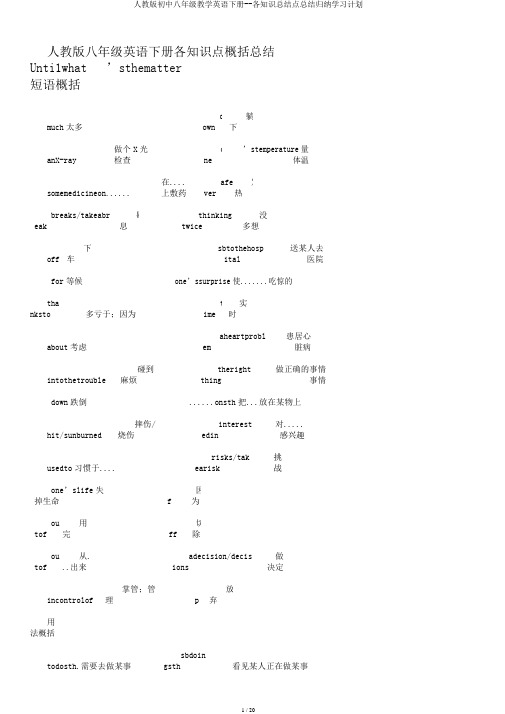
人教版八年级英语下册各知识点概括总结Unti1what ’sthematter短语概括much太多down躺下anX-ray 做个X光检查one’stemperature量体温somemedicineon......在....上敷药afever发热breaks/takeabr eak歇息thinkingtwice没多想off下车sbtothehospital送某人去医院for等候one’ssurprise使.......吃惊的thanksto多亏于;因为time实时about考虑aheartproblem患居心脏病intothetrouble碰到麻烦therightthing做正确的事情事情down跌倒......onsth把...放在某物上hit/sunburned摔伤/烧伤interestedin对.....感兴趣usedto习惯于....risks/takearisk挑战one’slife失掉生命of因为ou tof用完off切除ou tof从...出来adecision/decisions做决定incontrolof掌管;管理up放弃用法概括todosth.需要去做某事sbdoingsth看见某人正在做某事sbsth咨询某人某事sbtodosth希望某人做某事todosth想要做某事sb(to)dosth帮助某人做某事todosth想要做某事sbtodosth告诉某人做某事problems(in)doingsth 做某事有困难sthtodosth用某物去做某事usedtodoingsth 习惯于做某事todosth仿佛做某事ondoingsth持续做某事doingsth介怀做某事语法点1.咨询某人的健康问题及碰到麻烦的表达方法2.神态动词should的用法神态动词should的用法表示劝说与建议,也表义务与责任第一人称问句中,征询建议要记清3.不定代词的用法有关阅读方法推理判断阅读法精美解读1.What’sthematter(withyou)怎么了?出什么事了?What’sthetrouble/theproblem/wrongwithsb./sth.2.Ihadacold. 我感冒了。
人教版英语大纲初二下
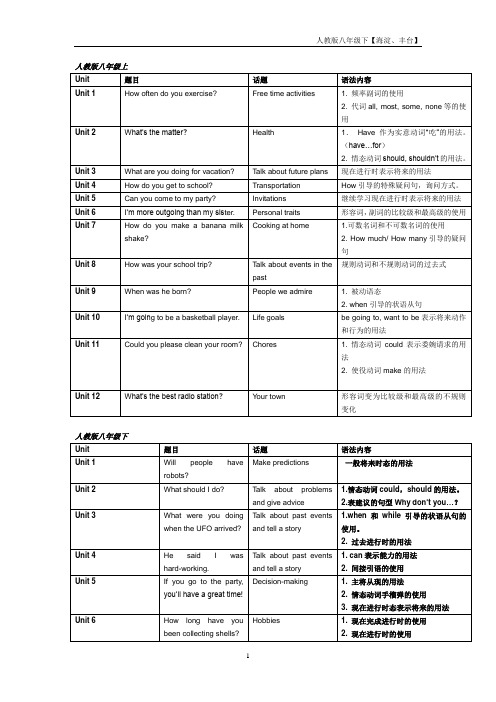
人教版八年级上人教版八年级下人教版八年级下精华知识总结(A)Unit 1 Will people have robots?一、话题:Make predictions二、3A文章In ten years, I think I’ll be a reporter. I’ll live in Shanghai, because I went to Shanghai last year and fell in love with it. I think it’s really a beautiful city. As a reporter, I will meet lots of interesting people. I think I’ll live in an apartment with my best friends, because my mother hates them, and our apartment is too small. So in ten years, I’ll have many different pets. I might even keep a pet parrot! I’ll probably go skating and swimming e very day. During the week I’ll look smart, and probably will wear a suit. At the weekends, I’ll be able to dress more casually.I think I’ll go to Hong Kong on vacation, and one day I might even visit Australia.核心单词robot, paper, less, fewer, simple, unpleasant, factory, seem四、重点点睛(1) alone, lonely (2) such, so(3) seem@seem + n. & a. He seems a bad guy. The boy seemed a little upset.@seem like,“好像、似乎”@seem to do sth.@It seems/seemed that五、核心语法:一般将来时用法;表示将来的时间状语;构成: @will/shall + do @be going to do句式变换;特殊现象:有迹象:be going to;时间或条件状语从句中,主将从现;There be 句型的一般将来时。
- 1、下载文档前请自行甄别文档内容的完整性,平台不提供额外的编辑、内容补充、找答案等附加服务。
- 2、"仅部分预览"的文档,不可在线预览部分如存在完整性等问题,可反馈申请退款(可完整预览的文档不适用该条件!)。
- 3、如文档侵犯您的权益,请联系客服反馈,我们会尽快为您处理(人工客服工作时间:9:00-18:30)。
Unit 3 Could you please clean your room?
B. 作宾语——动词 want, decide, hope, ask, agree, choose, learn, plan, need, teach, prepare,等后 常接动词不定式作宾语。
常用形式:
V.+ to do sth.
C. 作(后置)定语 常用形式: ①have/has+sth.+to do ②enough+名词+to do ③It’s time to do sth.
Could you please...?句型
(1)请求别人时通常用此句型.用could在语气上更委 婉、客气、诚恳。
(2)对could you/I...?的问句作出回答 肯定:sure/certainly/of course 否定:sorry或oh,please don’t…
(3)表示请求的句式: Would you like to do...? Would you mind doing...? Let’s do.... Shall I/we do...? Please do...(祈使句前加please)
二 情态动词should的用法
1.Should为情态动词,意为“应该;应当”, 否定式为shouldn’t,其后接动词原形,无人称 和数的变化。常用来表示征询意见、建议、劝 告、要求或义务等。
2.Should用于主语为第一人称的疑问句,表示 征询意见。
【拓展】在英语中,表示建议:
①Would you like (to do) sth.? = feel like doing 想要/愿意(做)某事吗? ②Shall I/we do sth ?做…好吗? ③Why not do sth ? = why don't you do sth ?为什么不…呢? ④How/What about doing sth ?做某事怎么样? ⑤Let’s do sth让我们做…吧。 。 ⑥had better (not) do sth最好(不)要做某事。
比较:could you please...和 could I Please... 前者是请求别人帮忙 后者是有礼貌地向别人请求允许
Unit 4 Why don't you talk to your parents?
一、提建议向别人发出邀请,请求,建议,或征求某人 的意见的其他表达方式:
How /what about doing sth.?…怎么样? You’d better (not) do something.最好(不)做某事 Would you like sth …?想要… Let‟s do sth…? What should I do …?
一感(feel) 二听(listen to, hear) 三让(let, make, have) 五看(look at, see, watch, notice,observe) 半帮助(help)
E. 动词不定式作状语
主要用来修饰动词,表示目的,结果或原 因。为了强调目的,有时可以把动词不定 式放在句首,或在不定式前加 in order (to) 或so as (to) “为了,目的 是常”用。结构:
二、until, so that ,although引导的状语从句:
1.在带有till或until引导的时间状语从句里,如果 主句用肯定式,表示“一直到…时”,谓语动 词只能用延续性动词。
Unit 2 I'll help clean up the city parks
•动词不定式
A. 作主语 B. 作宾语 C. 作(后置)定语 D. 作宾语补足语 E. 动词不定式作状语 F. 固定句式
A. 作主语——为避免句子的头重脚轻,常 用it作为形式主语,而真正的主语动词不 定式后置。
常用句型: ①It +be+adj./n.+(for/of sb.) to do sth. ②It takes sb. some time to do sth.
Review of Units 1-5
Unit 1 What’s the matter?
一、询问某人的健康问题及遇到麻 烦的表达方法
二、情态动词should的用法
一、 询问某人的健康问运及遭到麻烦的表达方法
(1)询问某人患了何种疾病或遇到了何种麻烦时, 常用以下几种结构来表达:
What’s the matter (with sb.)?(某人)怎么了? What’s wrong (with sb.)?(某人)怎么了? What’s the trouble (with sb.)?(某人)出什么事 了? What happened (to sb.)?(某人)发生了什么事? Are you OK?你没事吧? Is there anything wrong with sb.?某人有什么事吗?
D. 作宾语补足语 tell, ask, want, invite, teach, like, call,等 可接带to的动词不定式作宾语补足语
常用形式: tell/ask/want /call/invite sb. to do sth.
【注意】
动词不定式作使役动词和感官动词的宾语 补足语时应省去to:
(2)要表达身体疼痛或不舒服,可用以下结构:
①某人+have/has+病症. ②某人 +have/has+a+headache/toothache/stomachache/back ache/earache. ③某人+have/has+a+sore+发病部位. ④某人+hurt(s)+身体部位或反身代词. ⑤某部位+hurt(s). ⑥某人+have/has+a pain+in one’s+身体部位。 ⑦(There is)something wrong with one’s+身体部位.
